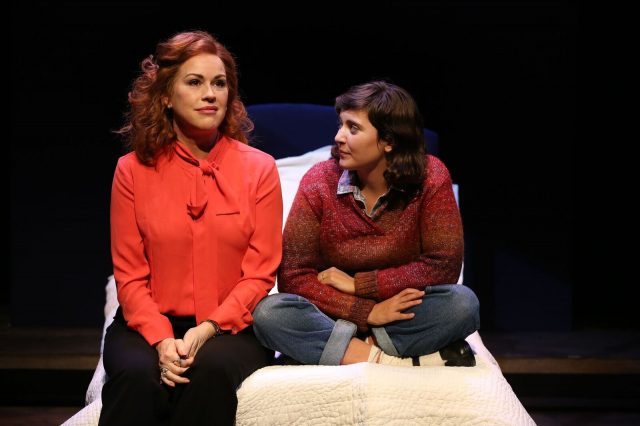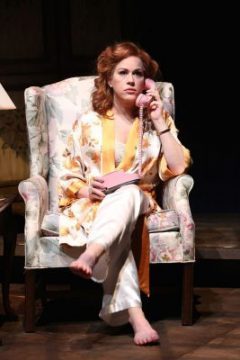
Molly Ringwald and Hannah Dunne play mother and daughter in U.S. premiere of TERMS OF ENDEARMENT (photo by Carol Rosegg)
59E59 Theaters
59 East 59th St. between Park & Madison Aves.
Tuesday – Sunday through December 11, $70
212-279-4200
www.59e59.org
My beloved fourth-grade teacher, Miss Schimmenti, taught us to never use the word “nice,” emphasizing that it was a meaningless adjective and urging us to always look for a better, more specific modifier when trying to describe something. Meanwhile, I have virtually banned myself from using the word “perfect,” since it has become ubiquitous and vastly misused, as very few things are absolutely perfect. Thus, I am struggling to find the right words to describe the U.S. premiere of Dan Gordon’s Terms of Endearment, which I found to be, well, perfectly nice. First produced in 2007, the show is based on both the 1975 novel by Pulitzer Prize winner Larry McMurtry and the screenplay by James L. Brooks, who also directed the Oscar-winning 1983 film, which won five Academy Awards and was nominated for another six. The movie features memorable performances by Shirley MacLaine as Aurora Greenway, a widowed mother who is unhappy with certain choices made by her daughter, Emma, played by Debra Winger. Emma is preparing to marry Flap Houston, played by Jeff Daniels; meanwhile, Jack Nicholson nearly steals the film as Garrett Breedlove, a boozing, womanizing astronaut who lives next door to Aurora, who is outraged by his unsavory behavior. The original 2007 theatrer production was a vehicle for Dallas stalwart Linda Gray, who starred as Aurora on a UK tour that was supposed to come to the States but never did. But Terms of Endearment is at last making its U.S. debut, running at 59E59 through December 11, with Gray now serving as one of the presenters. Molly Ringwald (Cabaret, Enchanted April) has taken over the role of Aurora, and she does a perfectly nice job, as does Hannah Dunne (Mozart in the Jungle) as Emma, Denver Milord as Flap, Jessica DiGiovanni (Of Good Stock) as Patsy and others, and Jeb Brown (Beautiful: The Carole King Musical) as the wild and crazy Garrett.

Aurora Greenway (Molly Ringwald) keeps in touch with her daughter via phone in TERMS OF ENDEARMENT (photo by Carol Rosegg)
Aurora has been putting down Emma her whole life, and she’s getting even worse as her daughter’s wedding approaches. “Emma, you are not special enough to overcome a bad marriage,” she says. Six months later, she says, “I never fool myself, Emma. I’m always brutally honest with myself. I never try to whitewash the fact that you married badly.” Actually, there’s just about nothing that Emma can do to please her mother, who complains about her daughter’s weight, her clothing, her bank account, her hair, her husband, her living conditions, etc. But that doesn’t stop the good daughter from loving her mother and talking to her over the phone every day. Playwright and screenwriter Gordon (Irena’s Vow, Murder in the First) doesn’t really add anything new to the story, merely condensing the book and the film, hitting the tale’s high points but losing any edge and flow. It all turns choppy as Emma and Flap have a few kids, Flap might be cheating on her, and Emma becomes seriously ill. The scene in which Aurora and Garrett meet with Dr. Maise (John C. Vennema) feels like it’s from a different play. Michael McDonald’s middle America costumes look perfectly nice on Ringwald (MacLaine’s wardrobe in the film was to die for), but David L. Arsenault’s set, constructed around invisible boundaries that separate Aurora’s living room, Emma’s bed (through the years), Emma and Flap’s couch and kitchen, and Garrett’s front door, gets confusing, forcing the audience too often to have to figure out how the geometry works as characters go from one place to another. Troupes such as the Godlight Theatre Company (Deliverance, In the Heat of the Night) and Ivo van Hove’s Toneelgroep Amsterdam (Scenes from a Marriage, Cries and Whispers) adapt novels and/or the movies they’ve been turned into by using creative staging techniques that are unique and inventive, but Gordon and director Michael Parva merely rehash this familiar story without any real panache. You could say that it’s all perfectly nice. Or, as Emma tells her mother early on, “Well, what is the point?!” (Oh, and sorry, Miss Schimmenti.)